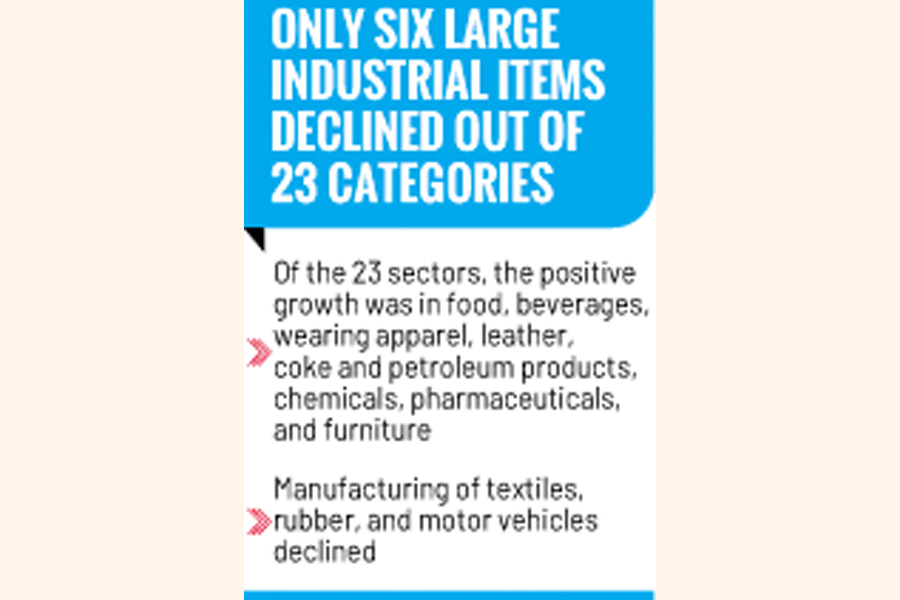Jan large-scale manufacturing 6.85pc up
Economists count on few drivers, amid downside pulls

Published :
Updated :

A rebound in large-scale manufacturing (LSM) despite downside pulls like import curbs amid dollar dearth relieved much of economic stress Bangladesh faces, largely as a few drivers helped out.
The LSM quantum in the country's industrial sector rose 6.85 per cent in January, after a downturn for three months in a row since October, according to latest data released by the Bangladesh Bureau of Statistics (BBS) in the last week.
This is seen as a clear indication of a pickup in the manufacturing sector notwithstanding the import restrictions and dollar liquidity shortages.
Such large-scale industries have around 11-percent contribution to the economy.
The quantum index of LSM industries was 244.36 points in January compared to 228.70 in the same month a year earlier.
The annual change in the LSM index has been mostly positive. Only six large industrial items dropped out of 23 categories.
Economists say the economic activity had surged as the entrepreneurs wanted to raise the supply volume before the holy month of Ramadan a when the demand usually picks up buoyed by a shopping binge.
Despite the domestic downside risks for the industrial sector such as high input cost and high policy rate, the LSM recorded a growth above the potential level for the month, they mentioned, on a note of surprise though.
They wonder how an entrepreneur had produced amidst the import restrictions, higher inflationary pressures and dollar shortages.
"I cannot explain the January economic activity picking up as there were many problems with raising productivity. For example, shortage of dollars and import restrictions on raw materials or semi-finished products," Dr Zahid Hussain, a former lead economist of the World Bank, told the FE.
He, however, mentions a push from fuel supply. During January, when Bangladesh usually experiences winter, the supply of electricity usually remains better.
Dr M. Masrur Reaz, chairman and CEO of Policy Exchange, told the FE correspondent that there were some seasonal impacts behind the surge in the large-scale industrial economic activity.
"Winter festivity and preparation for the holy month of Ramadan were the main drivers," says Dr Masrur.
Also, there were huge productions of food and beverage as well as tobacco products on the occasion of the January- 7 general election.
The Policy Exchange CEO also counts on better domestic textile production during January on the occasion of Eid-ul-Fitr.
"There were some eases of imports before Ramadan and this also contributed much".
Dr. Masrur forecasts that clothing manufacturing will continue to pick up in the coming months "unless there is major tension in the Middle-Eastern region over the Israel- Iran conflicts".
Beverage production will increase further due to the hot temperature in the country because of climate change, with the mercury fired up to 42.6 degrees Celsius on Saturday.
Of the 23 sectors, the positive growth was in food, beverages, wearing apparel, leather, coke and petroleum products, chemicals, pharmaceuticals, and furniture.
Manufacturing of textiles, rubber, and motor vehicles declined.
The food products grew by 17.6 per cent in January over its corresponding period a year earlier. Beverage increased by nearly 32 per cent during the period under review.
The clothing sector, which has summer orders, grew by 11.88 per cent in January 2024.
Manufacturing of chemicals and chemical products expanded by 11.47 per cent while pharmaceuticals grew by nearly 2.8 per cent.
The manufacturing of computer, electronic and optical products grew by nearly 11 per cent in January last.
jasimharoon@yahoo.com


 For all latest news, follow The Financial Express Google News channel.
For all latest news, follow The Financial Express Google News channel.